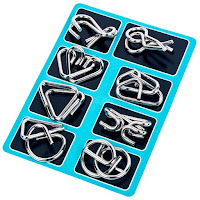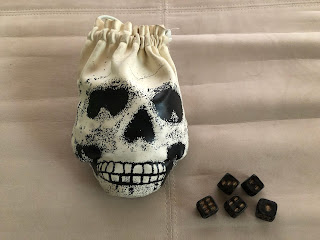 |
| Puzzle from Mansions of Madness board game - 1st Ed |
Zhuangzi dreamed he was a butterfly and when he woke, he wondered if he was a butterfly dreaming he was a man.
So, does adding real puzzles in a RPG add to immersion?
In the board game The Mansions of Madness, there are various puzzles that must be solved to unlock clues, rooms, or objects, depending on the scenario's goals. Most are trivial to solve, but require some number of moves to solve them. The goal is to solve them within a set number of moves dictated by a PC's stat. These puzzles are marginally interesting and adds some color to the game.
In some RPGs, there are some real puzzles. Some are physical such as bent metal puzzles or wooden cube puzzles. These are sometimes used in face-to-face table top RPGs or in LARPs.
 |
| Wire Puzzles |
 |
| Wooden Block Puzzle |
More commonly, in online TTRPGs or face-to-face, a word puzzle (riddles and anagrams are common) is handed out or something in code that needs to be cracked.
The problem is that these puzzles rely on the abilities and knowledge of the Player, not the PC. And they are either trivial (so why bother) or really, really hard. In the hard case, what you'll see is that at one point, everyone at the table will give up except for that one person who will continue trying.
In one LARP, the GMs took two puzzles, disassembled them, and removed a few parts, to make solving it impossible. About half hour into the LARP, the GM took aside the poor guy who was trying to solve the puzzle and told him to give up.
In another game, we were given a substitution cypher to figure out. This is common in games where the clue is in another language or strange symbols and you need to translate it. I actually took a graduate course in cryptography, so most of this is grunge work for me and not that interesting. After most of the other Players decided they weren't interested, I think I solved it in a under a minute. Yeah, most times, your run of the mill RPG Player will give up and ask the GM if they can just roll dice to figure it out.
So, if you are going to put a puzzle in, be prepared to have a easy solve backup plan, such as a die roll that will solve the puzzle. When that happens, just hand them the solved clue.
If you are going to use a puzzle, the most effective thing is maybe a treasure hunt that unlocks a box, so no special skill is needed to solve the puzzle.
Either parts of a combination lock code (R23-L12-R10) is handed out as clues or possible keys are handed out. In one game, the GM taped clues to opening the box under various items in our room. And inside the box was an item of interest. The only problem with a combination lock, is that some people can open them without the combination. We found the first 2 parts, then we brute forced the last code. Note: Don't give out parts of the code in solve order.









